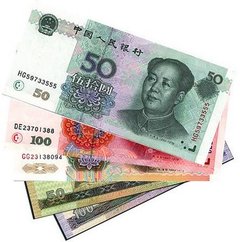London is to become a Chinese currency dealing hub, the People’s Bank of China and the Bank of England announced today after agreeing on a Memorandum of Understanding which will be signed on Monday.
In the memorandum of understanding, the two central banks set out clearing and settlement arrangements for the yuan (or renminbi) in London.
London media reported today that after the signing, a London clearing bank for the Chinese currency will be appointed. Currently, approximately 62% of renminbi payments overseas occur in London, according to SWIFT data.
London of growing importance for Chinese currency
In 2013, an agreement with Beijing established that in the West only London asset managers can invest directly in Chinese stocks and shares in renminbi.

The Bank of England and the People’s Bank of China signed a 3-year currency swap deal in 2013 worth 200 billion renminbis. The arrangement allows the two central banks to swap currencies that can be used by companies to settle business in local currency instead of dollars.
The International Finance Corporation issued a highly-sought after 1 billion renminbi bond in London earlier this month, the first by any international institution. The International Finance Corporation is the private sector part of the World Bank.
UK and Chinese leaders discuss greater cooperation
British Prime Minister David Cameron and Chinese President Xi Jinping discussed the cooperation between the two central banks on March 25th in a bilateral meeting in the margins of the Nuclear Security Summit in the Netherlands.
The United Kingdom was the first G-7 national to agree a renminbi swap line with the People’s Bank of China, and the deal on settlement and clearing arrangements, the first outside Asia, “is the logical next step to giving the international market in London the confidence to expand their RMB activities. A London clearing bank would complement the main clearing and settlement infrastructure in Hong Kong by supporting efficient transfer of funds within the Western time zone,” the UK Treasury wrote in a press release.
Part of UK’s economic plan, Osborne said

The Rt Hon George Osborne, the UK’s Chancellor of the Exchequer, said:
“Connecting Britain to the fastest growing parts of the world is central to our economic plan. It’s why I’ve put such government effort over the last three years into making sure we’re the leading western centre for trading in the Chinese currency, the renminbi.”
“That effort has paid off – and today’s agreement, the first outside Asia on clearing and settlement arrangements, is another major step forward. It is great news and I look forward to the appointment of a clearing bank soon.”
“Of course, other Western countries will follow, but London now has the critical mass of infrastructure, helping to put Britain at the front of the global race. This means jobs and investment in the future.”
Since making Hong Kong its first offshore trading center for the Chinese currency in 2009, several major financial centers have competed to help Beijing, making the yuan a serious contender to the dollar for global supremacy.
Singapore and London have emerged as China’s favorite candidates, with Kuala Lumpur, Luxembourg, Sydney, and Tokyo also positioning themselves for a place.
Chinese currency rising in importance globally
The renminbi (yuan) has climbed rapidly up the global currency ladder. According to the Bank for International Settlements, it is currently the 9th most traded currency globally. It is still a very long way behind the dollar. Government controls hinder the Chinese currency, making it hard for businesses to pay directly in yuan for cross-border trade.
Janet Min, head of the China desk at Royal Bank of Scotland in London, said in an interview with the Wall Street Journal:
“Currently London has to rely on Hong Kong for renminbi liquidity and clearing services. But, having a clearing bank in London…would help to further develop renminbi-related trading and bond-issuance activities in the City. It would also help other financial centers in Europe…develop renminbi business through access to a London-based renminbi clearing bank with only an hour time difference.”
